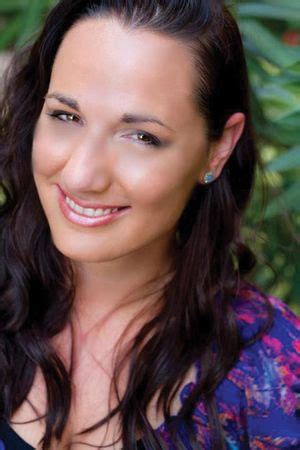A Quote by Anais Nin
She had lost herself somewhere along the frontier between her inventions, her stories, her fantasies and her true self. The boundaries had become effaced, the tracks lost, she had walked into pure chaos, and not a chaos which carried her like the galloping of romantic riders in operas and legends, but which suddenly revealed the stage props: a papier-mâché horse.
Related Quotes
[Keeping kosher was] the symbol of an initiation, like the insignia of a secret brotherhood, that set her apart and gave her freedom and dignity. Every law whose yoke she accepted willingly seemed to add to her freedom: she herself had chosen . . . To enter that brotherhood. Her Judaism was no longer a stigma, a meaningless accident of birth from which she could escape . . . It had become a distinction, the essence of her self-hood, what she was, what she wanted to be, not merely what she happened to be.
I found her lying on her stomach, her hind legs stretched out straight, and her front feet folded back under her chest. She had laid her head on his grave. I saw the trail where she had dragged herself through the leaves. The way she lay there, I thought she was alive. I called her name. She made no movement. With the last ounce of strength in her body, she had dragged herself to the grave of Old Dan.
Selfishly, perhaps, Catti-brie had determined that the assassin was her own business. He had unnerved her, had stripped away years of training and discipline and reduced her to the quivering semblance of a frightened child. But she was a young woman now, no more a girl. She had to personally respond to that emotional humiliation, or the scars from it would haunt her to her grave, forever paralyzing her along her path to discover her true potential in life.
It was not the passion that was new to her, it was the yearning adoration. She knew she had always feared it, for it left her helpless; she feared it still, lest if se adored him too much, then she would lose herself, become effaced, and she did not want to be effaced, a slave, like a savage woman. She must not become a slave. She feared her adoration, yet she would not at once fight against it.
What parts had she discarded for the sake of her sanity? What had she cut from herself? Had he stared into her pupils he would have emerged, bewildered and blinking, on the far side of the earth. Was he awed by her? Absolutely. Did he respect her? Unequivocally. Want to be anything like her? No, never, not at all.
She was like me in lineaments-- her eyes Her hair, her features, all, to the very tone Even of her voice, they said were like to mine; But soften'd all, and temper'd into beauty; She had the same lone thoughts and wanderings, The quest of hidden knowledge, and a mind To comprehend the universe: nor these Alone, but with them gentler powers than mine, Pity, and smiles, and tears-- which I had not; And tenderness-- but that I had for her; Humility-- and that I never had. Her faults were mine-- her virtues were her own-- I loved her, and destroy'd her!
Lyra learns to her great cost that fantasy isn’t enough. She has been lying all her life, telling stories to people, making up fantasies, and suddenly she comes to a point where that’s not enough. All she can do is tell the truth. She tells the truth about her childhood, about the experiences she had in Oxford, and that is what saves her. True experience, not fantasy - reality, not lies - is what saves us in the end.
She had been sharing a house with him for a week, and he had not once flirted with her. He had worked with her, asked her opinion, slapped her on the knuckles figuratively speaking when she was on the wrong track, and acknowledged that she was right when she corrected him. Dammit, he had treated her like a human being.
Zoe readied her arrows. Grover lifted his pipes. Thalia raised her shield and I noticed a tear running down her cheek. Suddenly it occurred to me: this had happened to her before.She had been cornered on Half- Blood Hill. She'd willingly given her life for her friends. But this time she couldn't save us.
At that moment a very good thing was happening to her. Four good things had happened to her, in fact, since she came to Misselthwaite Manor. She had felt as if she had understood a robin and that he had understood her; she had run in the wind until her blood had grown warm; she had been healthily hungry for the first time in her life; and she had found out what it was to be sorry for someone.







































